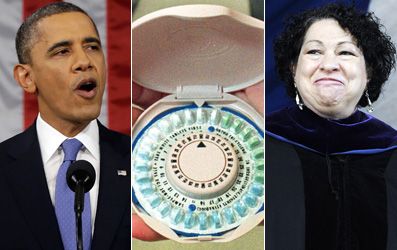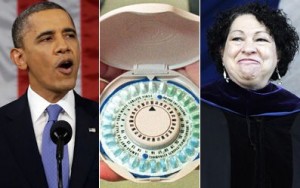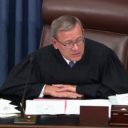
 Late last Tuesday, one day before it was set to go into effect, Supreme Court Justice Sonia Sotomayor blocked the ObamaCare birth control mandate for one Catholic group.
Late last Tuesday, one day before it was set to go into effect, Supreme Court Justice Sonia Sotomayor blocked the ObamaCare birth control mandate for one Catholic group.
In her order, Sotomayor said the federal government was temporarily barred from enforcing the ObamaCare birth control mandate on the Denver-based group, Little Sisters of the Poor Home for the Aged, and must respond by 10 a.m. Friday, a deadline that just came and went.
The government responded by asking the Supreme Court not to grant exemptions to religious organizations for the ObamaCare birth control mandate. “Applicants have no legal basis to challenge the self certification requirement or to complain that it involves them in the process of providing contraceptive coverage,” the administration claimed.
The request from the Obama administration contradicts the White House response Wednesday, which was an assurance the groups in question weren’t subject to the requirement, because it doesn’t apply to self-funded church plans.
Several organizations, including the Roman Catholic Archbishop of Washington, the Catholic Diocese of Nashville, Catholic University and the Michigan Catholic Conference, had asked justices to block the law until their arguments were heard.
The White House said the Justice Department has already made clear the mandate doesn’t apply to such organizations and that it defers to the agency on litigation matters.
“But [we] remain confident that our final rules strike the balance of providing women with free contraceptive coverage while preventing non-profit religious employers with religious objections to contraceptive coverage from having to contract, arrange, pay, or refer for such coverage,” the White House said Wednesday.
The Obama administration claims it already came up with a compromise, which accommodated religiously affiliated hospitals, universities and social service groups that oppose birth control. Yet, Noel J. Francisco, a lawyer for the Catholic groups, said the law still requires insurers — or the health plan’s outside administrator — to pay for birth control coverage.
In arguments he said, “a regulatory mandate will expose numerous Catholic organizations to draconian fines unless they abandon their religious convictions and take actions that facilitate access to abortion-inducing drugs, contraceptives and sterilization for their employees and students.”
“In short, under the accommodation, applicants must authorize their third party administrators or insurance companies to provide the very products and services they find morally objectionable,” he said. “Suffice it to say, the ‘accommodation’ does not resolve applicants’ religious objection to participation in this regulatory scheme.”
Francisco said 11 federal judges have entered permanent or temporary injunctions against the ObamaCare birth control mandate, while 6 have refused to do so.
If Catholic organizations and other Christian objectors don’t comply with the law, they face “fines of $100 a day per affected beneficiary” and if they drop their health care coverage, “they will be subject to an annual fine of $2,000 per full-time employee after the first 30 employees, and/or face ruinous practical consequences due to their inability to offer a crucial health care benefit to employees.”
Francisco added, “In short, applicants are faced with a stark choice: violate their religious beliefs or pay potentially crippling fines.”
In America, more than 90 million individuals participate in health care plans that are supposedly excluded from the the mandate, Francisco said. “The government, however, has steadfastly refused to create a broader religious exemption, either for individuals seeking to run their businesses in accordance with their faith or for nonprofit religious organizations beyond houses of worship,” he said.
The Supreme Court already agreed to hear cases on whether businesses may use religious objections to escape a requirement to cover birth control for employees. In March, the high court will hear two cases involving Hobby Lobby Inc., an Oklahoma City-based arts and crafts chain with 13,000 full-time employees, and Conestoga Wood Specialties Corp., a Pennsylvania cabinet-making company that employs 950 people.
Hobby Lobby won in the lower courts while Conestoga Wood Specialties lost. The combined cases probably will be argued in late March with a decision coming by summer.






